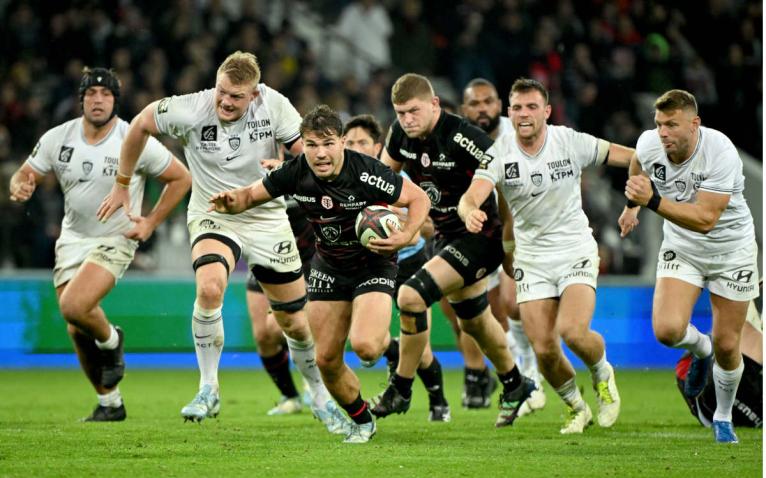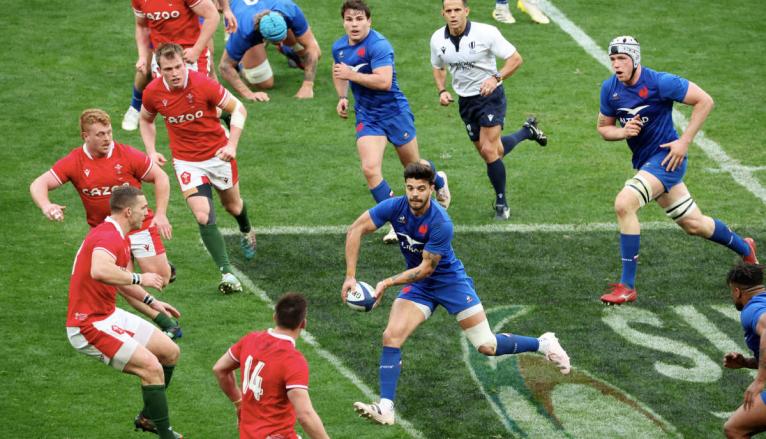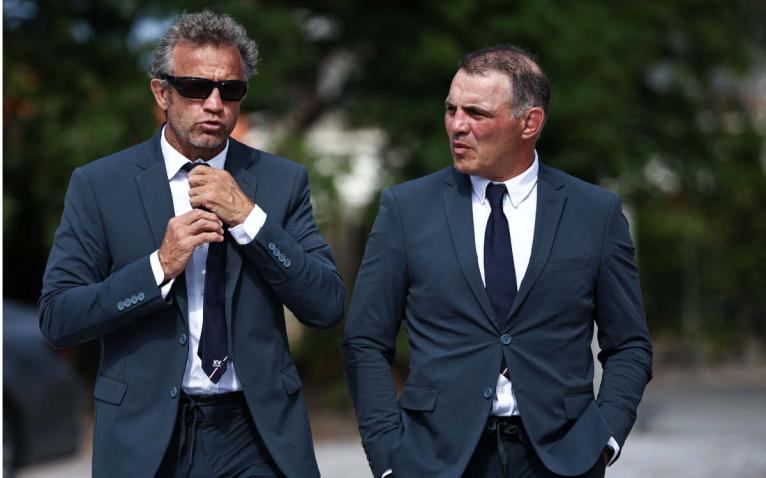Florian Grill was re-elected the president of the French Rugby Federation last month, and in one of his first interviews he declared that ‘there will be a before and an after Mendoza’.
That was a reference to the first Test in the Argentine city last summer, a match that France won, but which will forever be remembered more for what happened in the evening that followed the 28-13 victory.
Alcohol was drunk, a heck of a lot, and consequently one player – Melvyn Jaminet – uploaded a video of himself making racial slurs, and two others ended up in their hotel room with a woman. What exactly happened in the room is still being investigated by the Mendoza police and judiciary, suffice to say whatever the outcome is has not reflected well on the players or the staff.
There was general incredulity in France that the squad was given licence to party into the night when there was a midweek game against Uruguay and then the second Test against the Pumas on the following Saturday.
‘When we’re in the French team, when we have the chance to wear the cockerel…it’s also a lot responsibilities and a lot of obligations,’ said Grill.
In the wake of the Mendoza affair, the FFR spent the summer consulting figures from within the professional and amateur game – and not just in France – as well as representatives from other sports. The result was unveiled last week: a 29-page ethics charter containing 20 measures that every player and coach must absorb. The measures come under three headings: Prevention, Organisation and Evaluation/sanctions.

Frankly, much of it could be summarised as ‘stating the bleeding obvious’. It shouldn’t be necessary to introduce restrictions on alcohol consumption during tours and tournaments, nor remind players that they are role models to millions.
If one was being harsh on Galthie, one might say that since he took charge of the Bleus in 2019, he has focused so much on improving their on-field performance that he neglected to keep an eye on their behaviour off it.
Another result of what happened in Argentina is the return of Raphael Ibanez. The popular former captain and hooker was an integral part of the management staff up to and including last year’s RWC. Then he abruptly left. It was rumoured he had fallen out of favour with the autocratic Galthie.
One can detect the hand of Grill in the return of Ibanez, in a role that has been described as the ‘guardian of the order and values of the French team’.
Galthie might also be advised to pick the brains of Ibanez with a view to improving the team’s standing on the pitch.
So far this calendar year, France have a 57% win ratio, the worst return for Galthie since he took the helm in 2019. They’ve lost twice (to Ireland and Argentina), drawn with Italy, and among their victories were squeaky-bum wins against Scotland and England.
So far this calendar year, France have a 57% win ratio, the worst return for Galthie since he took the helm in 2019. They’ve lost twice (to Ireland and Argentina), drawn with Italy, and among their victories were squeaky-bum wins against Scotland and England. It has been a far cry from 2022 when France went the year unbeaten, and one British newspaper said that their rugby was in ‘perfect harmony’ and the World Cup was there for the taking.
And then came that quarter-final defeat to South Africa. Sure, the Springboks got the rub of the referees’ decision, but Galthie lost the strategic battle to Rassie Erasmus (a failing shared by Galthie and Steve Borthwick is their stubborn insistence on making what appear to be pre-planned substitutions in the final quarter of matches).
France also suffered from injuries to the spine of their team: Romain Ntmack and Paul Willemse missed the tournament completely, while Julien Marchand, Cyrille Baille, Jonathan Danty and Antoine Dupont all sat out games because of injury, and Anthony Jelonch was nowhere near match fit having just returned from a knee surgery.

The injuries to the players were sustained on international duty but they were inflicted on bodies weakened by the physicality of the Top 14. It’s the most glamorous, and arguably the most exciting, league in world rugby but it comes at a price.
Ask Willemse, whose future is in doubt after he was ordered by doctors last month to rest until the start of next year. The Montpellier lock has suffered six concussions in the last 12 months, and there is fear he will be forced into premature retirement, similar to another South African-born French international. Bernard Le Roux called time on his career this summer after nearly two years trying to recover from a series of injuries and concussions.
Romain Ntamack is another player wracked by injury. Seven months out with a knee injury last season, the Toulouse fly-half tore his calf last month and was omitted from Galthie’s list of 42 players for this month’s Tests against Japan, New Zealand and Argentina.
Unlike the Gallagher Premiership and the United Rugby Championship, which both kicked off on September 20, the Top 14 began a fortnight earlier. The finale to last season’s tournament was June 28, nearly three weeks after the final of the Premiership.
Baille is also absent, still recovering from the ankle ligament injury he picked up in June’s Top 14 semi-finals. Others overlooked by Galthie because of injuries were Bordeaux centre Nicolas Depoortère (fractured cheek) and Posolo Tuilagi (fractured tibia and fibula). Régis Montagne, the Clermont prop, and Joshua Brennan, the Irish-born Toulouse forward, withdrew from the squad on Monday after sustaining a facial injury in his side’s defeat to Bayonne the previous day.
Even by Top 14 standards, that was a brutal encounter. As well as Brennan, Jack Willis and scrum-half Paul Graou limped off for Toulouse, while Bayonne’s Xan Mousques and their captain Arthur Iturria were also wounded in battle, the latter expected to be out for three months with a shoulder injury.
Unlike the Gallagher Premiership and the United Rugby Championship, which both kicked off on September 20, the Top 14 began a fortnight earlier. The finale to last season’s tournament was June 28, nearly three weeks after the final of the Premiership.

Is it any wonder the attrition rate is so high in the Top 14? Players’ bodies just don’t have time to heal during the summer.
But that’s how it is for Galthie who, one suspects, says a little prayer each night asking for the Good Lord to keep Antoine Dupont free from injury. The scrum-half will lead out an experienced team on Saturday evening in Paris against Japan. Midi Olympique predicts that the only new cap is likely to be Tongan-born tighthead prop Tevita Tatafu. The back-row is expected to comprise Gregory Alldritt at No8 with Alexandre Roumat and Francois Cros on the flanks, while Thomas Ramos will start at No10 ahead of Matthieu Jalibert. In the centre, the veteran Gael Fickou, will be partnered by the exciting Anglo-Frenchman Émilien Gailleton.
Forwards coach William Servat was asked by Midi Olympique if the French team was at a crossroads in its evolution under Galthie. Servat’s response was to waffle about instilling confidence in the players and supporting them in difficult moments.


No wonder they've only won one Six Nations since 2010 and keep bombing out in the World Cup quarters.
Nice piece, which explains why a better management of players game time was one of the first evolution mentionned by the XV de France staff. Also why without a modification of the top 14 (or european cups), french squads will only be composed of second choice players for summer tourneys.
Besides France also lacked depth during the last world cup in comparison with teams such as springboks and ABs. First Galthié french squad barely had an average number of caps of 10 if I remember correctly. This is also an area they could work on, resting more veteran players who could still make RWC 2027 while capping younger players.